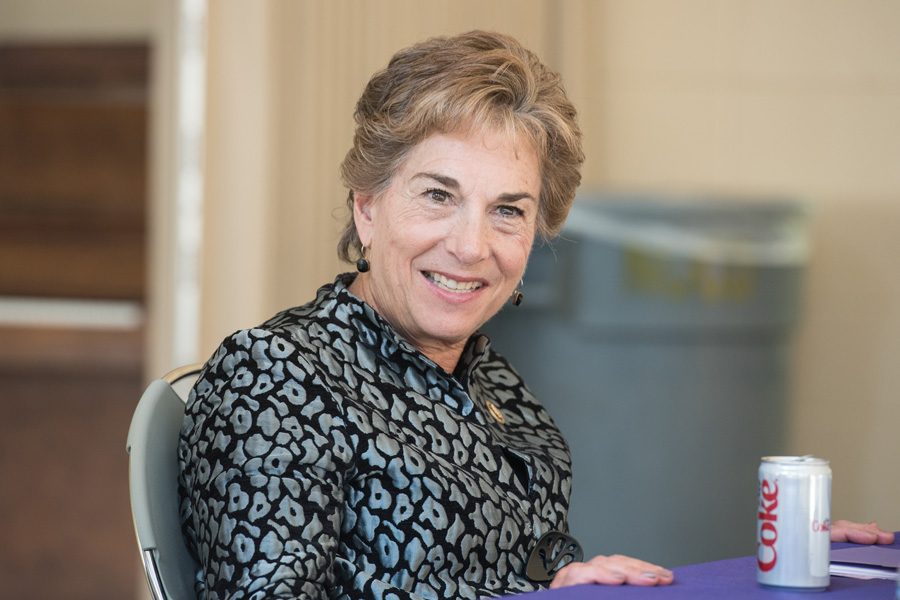Schakowsky’s bill to increase female representation passes House
Daily file photo by Colin Boyle
U.S. Rep. Jan Schakowsky (D-Illinois) at an event in October. Legislation Schakowsky introduced earlier this year that aims to increase women in foreign policy passed through the House on Tuesday.
November 16, 2016
U.S. House of Representatives passed a bill introduced by Rep. Jan Schakowsky (D-Ill.) that promotes women’s participation in peace negotiations in an effort to put women at the forefront of U.S. foreign policy.
The bill, passed by the House on Tuesday, ensures several points in an executive order President Barack Obama signed in 2011 cannot be overturned by any subsequent presidents.
The executive order Obama signed aimed to promote women’s participation in conflict prevention management and resolution. Obama called for an action plan to be created for women’s roles in conflict prevention to provide an integration of gender perspectives.
Following the goals of the executive order, the bill addresses the underrepresentation of women in conflict resolution discussions around the world and will require the Secretary of State and Department of Defense to report annually how taxpayer dollars are used to recruit women for leadership roles. Additionally, the bill attempts to eliminate barriers to equal participation in peace processes, and provide training to women negotiators and mediators on protections for women’s rights in conflict.
“Across time and around the world, women have been uniquely and disproportionately affected by armed conflict,” Schakowsky said in a statement Tuesday. “This legislation will ensure that women now have a meaningful role in peacebuilding, conflict resolution, and conflict prevention.”
According to the International Peace Institute, a peace agreement is 35 percent more likely to last at least 15 years if women participate in drafting the agreement. With a 5 percent increase in women’s political participation, a nation is five times less likely to use violence when faced with crisis.
“Women have proven to be influential forces in producing lasting peace within a community, yet are often underrepresented when it comes to conflict prevention and resolution,” Rep. Kristi Noem (R-SD) said. “With this legislation in place, we can be assured that women will have a meaningful seat at the table.”
According to the United States National Action Plan on Women, Peace and Security, women have represented less than 5 percent of mediators and 8 percent of negotiators to major peace processes in United Nations negotiations.
“The voices and concerns of women who endured violence and supported communities during conflict, and who will carry much of the burden of healing and rebuilding communities in peacetime, are routinely absent from or overlooked at the negotiating table,” the plan stated.
By bringing women into peace negotiations, the action plan seeks to address fostering institutions to create long lasting peace rather than focusing solely on ending fighting.
The United States will continue to work with women in Afghanistan, which implemented a 25 percent quota of female representation in its 2004 constitution. Supporting women abroad will help long-term stability in foreign relations, the national action plan says.
Obama’s executive order also tried to protect women during and after conflict from sexual and gender based violence including rape, sexual assault and sex trafficking. However, the bill only focuses on women’s role in foreign policy leadership.
Sen. Mark Kirk (R-Ill.) co-sponsored a similar bill in the Senate to ensure the implementation of Obama’s plan.
“Now is the time for more women across the world to have a bigger and more pronounced role in international peace talks and negotiations,” Kirk said in a statement in 2014. “This bill would empower women and ensure that they are part of the process to build lasting peace in regions afflicted by war, instability and violence.”
Schakowsky said the bill would bolster national security. Schakowsky’s bill still needs to be passed by the Senate before presidential review.
“The United States plays a crucial role in promoting peace all over the world,” she said. “By making women’s participation in the peace process a national priority, we will improve national and global security.”
Email: [email protected]
Twitter: @samkrevlin


